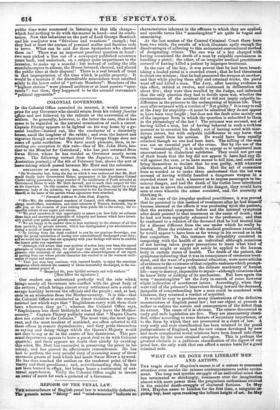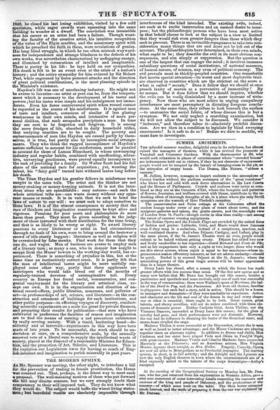WHAT CAN BE DONE FOR 'LITERARY MEN AND ARTISTS.
Tee tragic close of Haydon's career is of a nature to command attention even amidst the intense contemporaneous public excite- ment. The long and terrible struggle of an individual mind that has terminated so shockingly, domineers over the imagination almost with more power than the gregarious enthusiasm evolved in the suicidal death-struggle of shattered factions. In May 1804, Haydon came to London for the first time, a sanguine as- piring boy, bent upon reaching the loftiest height of art. In May 1846, he closed his last losing exhibition, visited by a few cold spectators, while eager crowds were squeezing into the same building to wonder at a dwarf. The conviction was irresistible that his career as an artist had been a failure. Though want- ing the faculty of the creative artist, his intuitive recognition of the value of the Elgin marbles, and the missionary spirit with which he preached the faith in them, were revelations of genius. His long blind struggle, in Which he too often mistook wayward- ness for independence and strange blindness to the defects of his own works, was nevertheless characterized by unflagging energy, and illumined by coruscations of intellect and imagination. There is poetry in his life : he lays hold on our sympathies. His death is felt to be an event even at the crisis of a nation's history ; and the active sympathy for him evinced by Sir Robert Peel, while engrossed by fierce personal attacks and the direction of great political combinations, is the most pleasing episode in the Minister's existence.
Haydon's life was one of unrelaxing industry. He might not be averse to luxuries—no artist or poet can be, from the tempera- ment which is necessary to the development of his tastes and powers ; but his tastes were simple and his indulgences not immo- derate. Even his fierce controversial spirit when roused cannot be regarded as the source of his misfortunes. It is against men of taste and intellect, conscious of similar if less glaring weaknesses in their own minds, and irretentive of mere per- sonal dislikes, that such escapades precipitate a man. In tune they are sure to be forgotten and forgiven. It is among the mere drudges of life, absorbed in daily household trifles, that undying enmities are to be sought. The poverty and embarrassments of men like Haydon are caused partly by them- selves, it is true, but partly also by incompliance social arrange- ments. They who think the rugged of Haydon nature sufficient to account for his misfortunes, must be puzzled to account for those of Leman Blanchard, in whom unwearying industry and regular habits, combined with unoffending, attrac- tive' unvarying gentleness, were proved equally incompetent to the task of providing for a family. Sir Walter Scott had his full share of the national taste for acquisition • yet, wanting the talent, his "fairy gold" turned into withered leaves long before his death.
The Titan Haydon and his gentler fellows in misfortune were caught in the same toils. The artist and the thinker are not money-making or money-keeping animals. It is not the luxu- rious alone who are spendthrifts : easy natures—and such the whole artistical tribe are—can waste money without any appa- rent means or result. It is in vain that we seek to bend the laws of nature to our will : we must seek to adapt ourselves to those laws. It is of the utmost consequence to society that the race of thinkers and imaginative constructors be kept alive and vigorous. Pensions for poor poets and philosophers do more harm than good. They must be given according to the judg- ment of those intrusted with their distribution for the time being, and that is as likely to be wrong as right. To award literary pensions to every litterateur or artist in bad circumstances through no fault of his own, were to bring around the bestower a crowd of idle sturdy beggars : literature as well as religion will be overstocked by false monks. Find work for them that they can do, and wages. Men of business are averse to employ men of a literary turn • as many a one, who in despair has sought to escape from the Muses' bowers to the working-day world, has ex- perienced. There is something of prejudice in this, but at the same time an instinctively correct sense. It is partly felt that the man of intellectual tastes might be more usefully em- ployed some other way, partly that these applicants are interlopers who would take bread out of the mouths of regularly-trained devotees of unimaginative toil. Every country in Europe has found useful, remunerative, and con- genial employment for the literary and artistical class, ex- cept our own. It is in the organization and direction of na- tional record-offices, public libraries, museums, and galleries of art—in professorships of art, science, and literature—in the con- struction and ornament of buildings for such institutions, and other public purposes—in effecting voyages of discovery, conduct- ing scientific experiments on a scale too great for private finances, and preparing their results for publication—that men who have cultivated in preference the faculties of reason and imagination are to find the means of earning a not precarious subsistence by really serving society. With a timid, hesitating hand—de- sultorily and at intervals—experiments in this way have been made of late years. To be successful, the work should be un- dertaken at once, on a comprehensive scale, by the annually renewed vote of a liberal sum to supply the intellectual wants of society, placed at the disposal of a responsible Minister for Educa- tion, and the promotion of Art, Science, and Literature. This is the expiation our Legislature owes for leaving so much of Eng- lish intellect and imagination to perish miserably in past years.



























 Previous page
Previous page